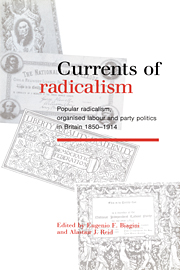 Currents of Radicalism
Currents of Radicalism Book contents
- Frontmatter
- Contents
- Notes on contributors
- Preface
- 1 Currents of radicalism, 1850–1914
- Part I Continuities in popular radicalism
- Part II The Liberal party and the people
- 6 Trade unionists, Gladstonian Liberals, and the labour law reforms of 1875
- 7 Popular Liberals, Gladstonian finance, and the debate on taxation, 1860–1874
- 8 Gladstone and his rivals: popular Liberal perceptions of the party leadership in the political crisis of 1885–1886
- Part III Radicals, Liberals, and the Labour party
- Index
7 - Popular Liberals, Gladstonian finance, and the debate on taxation, 1860–1874
from Part II - The Liberal party and the people
Published online by Cambridge University Press: 07 September 2010
- Frontmatter
- Contents
- Notes on contributors
- Preface
- 1 Currents of radicalism, 1850–1914
- Part I Continuities in popular radicalism
- Part II The Liberal party and the people
- 6 Trade unionists, Gladstonian Liberals, and the labour law reforms of 1875
- 7 Popular Liberals, Gladstonian finance, and the debate on taxation, 1860–1874
- 8 Gladstone and his rivals: popular Liberal perceptions of the party leadership in the political crisis of 1885–1886
- Part III Radicals, Liberals, and the Labour party
- Index
Summary
It may be said of Mr Gladstone that he found the people who live in cottages hostile to political parties, and that he had succeeded in uniting them with the rest of his countrymen.
Historians of the labour movement have generally undervalued the importance of the Gladstonian finance and fiscal system in the making of the ‘liberal consensus’ in Victorian Britain. Yet there is little doubt that the point of view expressed by ‘Ironside’ in the passage quoted above would have been endorsed by many contemporaries of Ernest Jones and Thomas Burt, and that nineteenth-century historians and politicians were well aware of the social and political impact of the financial work of Peel and Gladstone. Even in the early twentieth century the legacy of free trade finance remained so important in popular politics that its preservation constituted one of the ‘causes’ on which parties supported by a majority of the working-class electors won the general elections of 1906, 1910, and 1923. Therefore the inconspicuous role of this factor in modern historiography is not easy to explain. Recently, however, after the publication of H. C. G. Matthew's article on the policy of mid-Victorian budgets, the tide has changed, with G. Stedman Jones' and R. McKibbin's important revisions of the history of the left. However, there has not as yet been a detailed study of the relationship between plebeian radicalism and Gladstonian finance.
- Type
- Chapter
- Information
- Currents of RadicalismPopular Radicalism, Organised Labour and Party Politics in Britain, 1850–1914, pp. 134 - 162Publisher: Cambridge University PressPrint publication year: 1991
- 4
- Cited by
